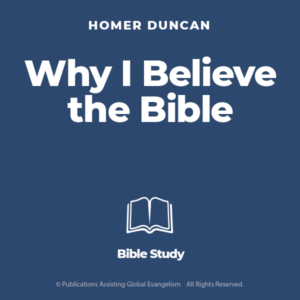Bible Study

HELPFUL HINTS ON ROMANS
By Homer Duncan
The book of Romans is considered by many to be the greatest masterpiece of writing in human history. The late Francis L. Patton, the godly and able president of Princeton University wrote, “The only hope of Christianity is in the rehabilitating of the Pauline theology. It is back, back, back to an incarnate Christ and the atoning blood, or it is on, to atheism and despair!
In writing this epistle to the Church at Rome in the year 60 A.D., the Apostle Paul gives a clear exposition of the Gospel of the grace of God. It is often said that the theme of this book is justification by faith, but much more than this is found here. Not only are we taught how to be right with a holy God, but also we are taught how to live triumphantly in the power of the Holy Spirit. In this book we are not only given a solid foundation for our faith, but also we are instructed in applied Christianity.
In studying any book in the Bible it is well to get an overall picture of the entire book in our minds before we try to master the details. In order to get this overall picture clearly in our minds we shall do two things. First we want to break the book up in to its logical divisions, and second we shall give a survey of the book chapter-by-chapter. This will enable us to see how the different parts of the book are related to each other.
Romans is divided into the following five natural, logical divisions:
- Sin (1:1-3:20)
- Salvation (3:21-5:11)
- Separation (5:12-8:39)
- Sovereignty (9, 10, 11)
- Service (12-16)
To put it another way:
- What we are by nature (1:1-3:20)
- How to become a Christian (3:21-5:11)
- How to live the Christian Life (5:12-8:39)
- Why Israel is set aside (9, 10, 11)
- How to serve God (12-16)
Or to give a theological outline:
- Condemnation (1:1-3:20)
- Justification (3:21-5:11)
- Sanctification (5:12-8:39)
- Dispensation (9, 10, 11)
- Glorification (12-16)
The divisions that are easier to memorize are as follows:
- 1:1-3:20
- 3:21-5:21
- 6-8
- 9-11
- 12-16
But to be technically correct we must make the second division end at 5:11, and the third begin with 5:12.
A SUMMARY OF EACH CHAPTER
Chapter One
- Introduction (1:17)
- Condemnation of the Wicked man (18-32)
Chapter Two
- The moral man is lost (1-16)
- The religious man is lost (17-29)
Chapter Three
- The advantage of the Jew (1-8)
- The whole world under condemnation (9-20)
- The doctrine of justification stated (21-31)
Chapter Four
- Justification by faith illustrated (1-8)
- Justification is apart from ordinances (9-21)
- Triumphant faith (13-25)
Chapter Five
- The results of justification (1-11)
- In Adam or in Christ (12-21)
Chapter Six
- We are one with Christ in His death and resurrection (1-12)
- We are not to yield our members to sin (13-23)
Chapter Seven
- The believer and the law (1-14)
- The conflict of the two natures (15-25)
Chapter Eight
- Our new standing (1-4)
- Our new life (5-13)
- Our new relationship (14-17)
- Our new hope (18-23)
- Our new help (24-28)
- Our new confidence (29-39)
Chapter Nine
- The sevenfold advantage of Israel (1-5)
- Distinction between natural and spiritual seed of Abraham (6-13)
- God’s sovereignty explained (14-24)
- The Gentiles salvation foretold (25-33)
Chapter Ten
- The righteousness of God (1-11)
- Missionary outreach (12-21)
Chapter Eleven
- Israel’s remnant (1-12)
- The Gentiles warned (13-25)
- Israel to be saved nationally (26-36)
Chapter Twelve
- The call for full surrender (1-2)
- Members of His body (3-8)
- Practical exhortations (9-21)
Chapter Thirteen
- The Christian and government (1-7)
- Love fulfills the law (8-14)
Chapter Fourteen
- Believers not to judge each other (1-12)
- Must walk according to conscience (13-23)
Chapter Fifteen
- Believers are to receive one another (1-13)
- Paul a minister to the Gentiles (14-21)
- Paul’s desire to come to Rome (22-33)
Chapter Sixteen
- Salutation to the saints (1-16)
- Warning about troublemakers (17-20)
- Salutation from the saints (21-24)
- Benediction (25-27)
INTRODUCTION
Paul tells us three things about himself:
(1) He is a bond slave (one who makes himself a slave willingly) of Christ, (2) He is called to be an apostle (missionary, a sent-one). (3) He is separated unto the Gospel of God.
In verse one we have the word “servant;” in verse three, the word “Son;” and in verse seven, the word “saints.” These three words should form an unbreakable chain. The servant of God brings others to the Son of God in order that they might be saints of God, who intern become servants of God, bringing others to the Son in a never-ending process. You and I should ask ourselves the question, “Has this chain been broken in my life?”
In verses 14, 15, and 16, we have the three great “I am’s” of the Apostle Paul. “I am debtor.” Paul recognized himself as a debtor to all men. He realized that he had a moral obligation to share with others the unsearchable riches of Christ which was the only means whereby they could be saved. “I am ready.” He was ready; not primarily because of his intellectual status or because of educational attainments, but primarily because he had a heart that was filled with the love and compassion of Christ. “I am not ashamed.” He was not ashamed of the Gospel of Christ because he knew it was the power of God unto salvation. Paul had seen the lives of vile sinners changed and transformed through this mighty message; he knew what the Gospel had done for him.
The righteousness of God is revealed (v.17), and the wrath of God is revealed (v.18). God is a God of wrath because He is a God of righteousness. Those who do not believe in the wrath of God fail to understand that God is holy and righteous and that he must punish sin.
DRIFTING FROM GOD
In verses 21-33 we trace the steps by which men drift away from God into awful sin:
- They fail to glorify God as God,
- They are not thankful,
- They become vain in their imaginations,
- Their heart is darkened with sin,
- They think themselves to be wise,
- They become fools,
- They become idolaters.
As a result, we have three red lights on the road to hell:
- God gave them up (v. 24)
- God gave them up (v. 26)
- God gave them over (v. 28)
We are actually shocked by the frank description that Paul gives of sin. We see God punishing sin with sin. Our first reaction is that men cannot possibly be this bad, and we think that Paul is overstating the awfulness of their condition. Then we discover that Seneca, a contemporary of the Apostle Paul had this to say, “This world is full of crimes and vices; more are committed than can be cured by force. There is an immense struggle for iniquity. Crimes are no longer hidden but open before the eyes. Innocence is not only rare but nowhere.”
Then we think, perhaps men were this bad back in Paul’s day, but now we live in an enlightened age. Education has taught men that they should live better lives than this. No, the same conditions can be found in the world today. When missionaries have gone to other lands and have read from this portion of the Bible, the people have said, “Hush, do not read that. It is not fair for you to thus expose us in public.” But we do not have to go to the other lands to find this condition. Go to the police department of any great city. There you will find that these same things are being practiced today.
This terrible indictment actually tells us what God sees in your heart and mind. Does such a statement shock you? Remember that the heart is deceitful above all things and desperately wicked (Jeremiah 17:9). If we have not committed these terrible sins it is only because we have been kept from doing so by the grace of God. The seed of all these terrible iniquities are in our hearts and only the mighty power of God can keep us from living in a veritable cesspool of iniquity.
Chapter one closes with the most terrible catalog of crimes listed anywhere in the Bible. We naturally reason that anyone who does all of these terrible things deserves the wrath and judgment of God, so in chapter 2 Paul says to us, “Therefore, thou art inexcusable, O man, whosoever thou art that judgest, for wherein thou judgest another, thou condemnest thyself; for thou that judgest doeth the same things.” In chapter two six great principles of judgment are stated:
- Judgment is according to truth (v.2).
- It is according to the principles of accumulated wrath (v. 5).
- It is according to our works (v. 6).
- It is without respect of persons (v. 11).
- The standard by which men are to be judged is the Gospel of Christ (v. 16)
- The judge will be Jesus Christ Himself (v. 16).
In these days when so many are resting on their church membership for their salvation, let us read 2:17 like this – Behold, thou art called a Christian, restest in the Gospel and makest thy boast of God and knowest His will and provest the things that are more excellent, being instructed out of the Bible. Let us read verses 24-29 as follows: For the name of God is blasphemed among the unbelievers because of the ungodly lives of professing Christians. Our church membership verily profiteth if we walk according to the Gospel; but if we do not walk in the light, our church membership becomes non-church membership. Therefore, if the man who is not a church member believes in Christ shall not his non-membership be counted for church membership? And shall not the non-church member, if he walk in the light of the Lord, judge thee who by church membership breaks the law of God. For he is not a Christian which is one outwardly, neither is church membership that which is outward in the flesh, but he is a Christian which is one inwardly and his membership is of the heart, in the Spirit, and not of the letter and his praise is not of men, but of God.
The important thing for us to learn from this first section of Romans is that we are lost and undone, without God and without hope. We must see ourselves as God sees us before we will turn to Christ as a wonderful, all-sufficient Savior.
HOW A SINNER CAN BE JUST AND RIGHT WITH A HOLY GOD
In this second section on justification by faith, the Apostle Paul does not start off by telling us what we must do in order to be saved. He rather tells us about the righteousness of God and how to get it. He states that the righteousness of God is by faith in Jesus Christ unto all and upon all them that believe. There is no other way to be saved but by grace through faith. The grace of God is what God does for hopeless, hell-deserving sinners by transforming them into Sons of God. We are reminded that all have sinned and come short of the glory of God (3:23). All of us may not have sinned in the same manner or in the same degree, but every man, woman, boy, and girl who is born into this world is a sinner in the sight of God. We have come short of His glory. Let us illustrate it in this way. Suppose that the requirement for salvation is that we must be able to jump fifty feet. Some of us can jump further than others. Perhaps some strong young men might be able to jump twenty-five feet, some might be able to jump fifteen feet, but no matter how far we could jump, all of us would still come far short of the requirements for salvation. Usually, the ones who live best according to human standards are the hardest ones to get saved because they pride themselves in their own attainments.
The Bible speaks of justification in four ways. We are justified by grace (3:24), we are justified by faith (5:1), we are justified by His blood (5:9), and we are justified by works (James 2:24). Yes, we are justified by faith in God’s sight, but we are justified by works in man’s sight. “You see then” is the key to this Scripture in the Book of James.
The word “propitiation” bothers some people. This word which occurs only three times in the New Testament – (Romans 3:25, 1 John 2:2, and 1 John 4:10), means a mercy seat. The Lord Jesus Christ is our mercy seat, through whom we come to God. His blood changes God’s judgment seat into a mercy seat.
“How can a holy God be just and yet at the same time justify sinners?” Verse twenty-six gives the answer to this question. God can be just and holy and at the same time justify and make righteous the vilest of sinners because He gave His Son, the Lord Jesus Christ, to die on the cross to pay the price for their sins. God cannot and does not save any man merely on the basis of his love for him. If God did this he would not be a holy and a just God.
Let me illustrated it in this way. Suppose that a young man in our community has committed a heinous crime and is brought before the judge. Suppose that the judge were to say something like this. “My boy, I have known you all of your life. Your father and I are the best of friends and because of my great love for you I am going to forgive you of the crime you have committed.” The judge could not do this and be just because if he did, the person who had been wronged by the boys crime would not receive justice. The penalty for the sin or the crime must be paid.
God loves all men and wants to save them, and because of the atoning death of Christ upon Calvary’s Cross, God can be just and yet at the same time the justifier of him that believeth in Jesus. This clearly shows us that salvation is on the basis of grace and not of works. If we were saved by our works we could, and we would boast, but salvation on this basis completely excludes any boasting. All of the glory and praise must be unto God. Salvation is not part faith and part works for Paul concludes by saying, “A man is justified by faith without the deeds of the law” (Rom 3:28).
The opening verse of chapter four give us two illustrations of two men who were justified by faith. The first was Abraham, the father of the Jewish nation, and the second was king David. Grace is a principle that is contrary to the thinking of the natural man. Man always reasons that he must do something to obtain favor with God. So here again we have Paul (cf. Rom. 4:2-5) repeating what he has already told us in chapter three. If Abraham were justified by works, he hath whereof to glory; but not before God. Instead Abraham believed God and his faith was counted to him for righteousness. When a person works for something it is not freely given to him, but he deserves it because he has earned it. Our salvation is not on this basis, but rather on the basis of grace. The Bible tells us that our righteousness (not our sins and wickedness, but our righteousness – the very best that we can do) is as filthy rages in the sight of God (Isaiah 64:6). Such righteousness cannot save anyone. If we are saved we must have Christ’s righteousness imputed to us.
If any man could have been saved by his own deeds it was the Apostle Paul for he said, “If any other thinketh that he hath whereof he might trust in the flesh, I more; Circumcised the eighth day, of the stock of Israel, of the tribe of Benjamin, an Hebrew of the Hebrews; as touching the law, a Pharisee; concerning zeal, persecuting the church; touching the righteousness which is in the law, blameless. But what things were gain to me, those I counted loss for Christ. Yea, doubtless, and I count all things but loss for the excellency of the knowledge of Christ Jesus my Lord: For whom I have suffered the loss of all things, and do count them but dung, that I may when Christ, and be found in Him, not having my own righteousness, which is of the law, but that which is through the faith of Christ, the righteousness which is of God by faith” (Philippians 3:9).
This does not mean that we do not believe in the importance of good works. Good works are the fruit of saving faith. Faith is the root and works are the fruit. We are not saved “by” good works, but we are saved “unto” good works (Eph 2:10). We are to work out that which God works within (Phil 2:12-13). We are to live in such a way that men may see our good works and glorify our Father which is in heaven (Matt 5:16). If we profess to have faith and do not have works it clearly shows that we have a dead faith (James 2:17) for faith that saves will result in works.
David exulted in such salvation. He was guilty of two of the greatest sins that a man can commit: adultery and murder, but by looking forward to the cross of Christ he could say, “Blessed are they whose iniquity is forgiven and whose sins are covered. Blessed is the man to whom the Lord will not impute sin” (Ps 32:1-2; Rom 4:7-8). God does not impute sins to those who believe on Christ because their sins were imputed to Christ when he was nailed to the accursed tree.
THE FAITH OF ABRAHAM
As we study the life of Abraham we find at least three great acts of faith in his life. The first was when God called him out of the land of the Ur of the Chaldees. He had to leave his country and his family and his friends and go into a land that God would show him. This indeed called for great faith on Abraham’s part, but he believed and obeyed God. This was not the act of faith that justified him in God’s sight. Later on, in Abraham’s life, we see another strong manifestation of his faith when he took his own son, Isaac, to the top of Mount Moriah, and was there ready to offer him as a sacrifice to God. This also was a great act of faith, but it was not the act of faith that justified him in the sight of God. This was rather the trial of his faith. Every true faith must be a tried faith, and any faith that will not stand trials shows that it is not a true or saving faith.
What then was the act of faith that justified Abraham in the sight of God? Paul makes this plain for us in chapter four and in verse 3: “Abraham believed God and it was counted unto him for righteousness.” This verse is a quotation of Genesis 15:6. As we study this record in the book of Genesis we find that God had just promised to Abraham that his seed would be as the stars in heaven for number. Abraham believed what God told him and this faith in the Word of God or the promises of God was counted to him, or was reckoned to him, or was imputed to him for righteousness. He was declared righteous in the sight of God simply because he had believed what God said. This is a basic principle for us to learn not only in the matter of our justification but also in our sanctification. We are justified by an act of faith, but we are to learn to live day by day in an attitude of faith.
Before we leave these opening verses of Romans four let me call your attention to the question that is asked in verse three. “For what saith the scripture?” These simple words can give us the basic principle concerning what we are to believe. It would seem that this principle is so clear and self-evident that no one would be led astray, but instead of basing our lives on what the Bible teaches we often talk about “historic principles” or “what my denomination believes,” or “What Dr. so-and-so says.” We are not able to arrive at the knowledge of the truth because we are blinded by prejudice. We study our Bible with colored glasses. When we wear colored glasses, everything that we see is tinted with that color. Most of us read our Bible with Baptist, Methodist, Presbyterian, or Lutheran glasses. Everything that we read and study is colored by what our church teaches. If we want to know the truth as it is in Christ we must be willing to throw away all of our colored glasses and come before God with an honest heart, asking this one question, “What saith the Scriptures?”
In verse 9-12 of chapter four we have a discussion of circumcision. The Scriptures clearly teach us that Abraham was justified before he was circumcised and that he received circumcision as a seal of the righteousness of faith. Circumcision is not an issue today, but baptism is. Many will argue that we must be baptized in order to be saved, but by comparing baptism with circumcision we see clearly that baptism follows our justification, and that we receive baptism as a seal of the righteousness of our faith. If we have saving faith we will be glad to be baptized in obedience to the command of Christ. Baptism is an outward manifestation of an inward faith.
Let your heart rejoice when you read and study Abraham’s faith in the last part of chapter four. “He staggered not at the promise of God through unbelief; but was strong in faith, giving glory to God” (Rom 4:20). May we also be strong in faith, giving glory to God.
THE RESULTS OF JUSTIFICATION BY FAITH
If we are justified by faith something will happen in our lives. Faith that does not change our lives is a dead faith. The Bible says, “Therefore if any man be in Christ he is a new creature: old things are passed away; behold all things are become new (2 Cor. 5:17). The first five verses of chapter 5 give nine results of justification.
- We have peace with God because we have been reconciled to Him through the death of His Son. We could never have peace with God on the basis of our works, because we would never know whether or not we had worked enough. Religionists all over the world who perform all manner of good works testify that such good works never give them peace with God. The Bible teaches three degrees of peace. (1) No peace (Is. 57:20-21). (2) Peace with God (Rom. 5:1), and (3) The peace of God (Phil. 4:6-7).
- We have access to God. This means that we can come boldly into the very presence of God (Heb 4:16). In the Old Testament times only the high priest could come into the holy of holies. He was permitted to enter this holy place just once a year on the day of atonement. With great fear and trembling he went behind the veil, holding in one hand a censor of smoking incense, and carrying in the other hand a vessel of blood to make atonement for his own sins, and then for the sins of the people (Heb. 5:3). We are told that a heavy raw hide cord was tied to his leg so that if he were struck dead by a Holy God his body could be dragged from beneath the veil. Thanks be to God, all of this is past. Now the weakest and the most unworthy believer can come boldly into the presence of God through the merits of His Son, the Lord Jesus Christ. We have access to God!
“Just as I am, without one plea,
But that Thy blood was shed for me,
And that thou bid’st me come to Thee,
O Lamb of God, I come! I come!
Just as I am and waiting not
To rid my soul of one dark blot,
To thee, whose blood can cleanse each spot,
O Lamb of God I come! I come!
Just as I am, Thou wilt receive,
Wilt welcome, pardon, cleanse, relieve;
Because Thy promise I believe,
O Lamb of God, I come! I come!
- We rejoice in hope of the glory of God. In most of Paul’s epistles he has much to say about the second coming of Christ. In the book of Titus he calls it the blessed hope (Titus 2:13). Here we might call it a rejoicing hope. In a world that is filled with darkness and despair how good it is to know that the Lord Jesus Christ is coming again as king of kings to rule and reign on the earth (Rev. 19:11-16).
- As natural men and women we shrink from testings and trials, but the Christian glories in tribulation. He knows that suffering, sorrow, and difficulties of every kind are a part of God’s plan for conforming him to the image of Christ.
- Tribulation worketh patience which is a rare virtue even among Christians. We want to be patient, but we are not willing to pay the price for it.
- The word translated “experience” (Rom. 5:4) in the King James version could better be translated ripeness of character or tested character.
- We have the word “hope” again. This time it is not only looking forward to the Blessed Hope of the second coming of Christ, but hope that we have now is the opposite of despair.
- This hope makes us not ashamed nor never disappoints us.
- The love of God is shed abroad in our hearts by the Holy Ghost.
SANCTIFICATION
We are now beginning the third division of Romans on how to live the Christian life. The last section of chapter five is one of the most difficult portions of the Bible. One key that will help us to understand this portion is that Paul is here talking about “sin” (singular-what we are) rather than “sins” (plural-what we do). The following outline given by William R. Newell will be of help.
God’s Plan: The “Reign of Grace” Through Christ (Romans 5:12-21)
- The Two Men
Adam
Christ - The Two Acts
Adam – one trespass: vv. 12, 15, 17, 18, 19
Christ – one righteous act (on the cross): v. 18 - The Two Results
By Adam – one condemnation, guilt, death; vv. 15, 16, 18, 19
By Christ – justification, life, kingship: v. 17, 18, 19 - The Two Kings
SIN – reigning through death: v. 17
GRACE – reigning through Righteousness: v. 21 - The Two Contrasted States
Condemned men, slaves of death, by Adam
Justified men, reigning in life, By Christ
VICTORY THROUGH CHRIST
Chapter 6 gives us the foundation for victorious Christian living. Victory is not found in chapter 6, but if we are to experience victory we must build upon the foundation laid here. A house can be built without a foundation, but if it is, the walls will crack and crumble, and it will soon fall down. In the same way we can seek to build a Christian life without building on the foundation that we find here, but if we do such a life will not last. It will be beset by difficulties of all kinds. There are four important words in this chapter: know (v. 3, 6, 9), reckon (v.11), yield (v. 13, 16, 19), and obey (v. 12, 16, 17).
Chapter five closed by telling us that where sin abounded grace did much more abound. We might therefore reason that the more sin we have the more grace we will have, so let us continue in sin that grace may abound. Paul answers such thinking by saying, “How shall we that are dead to sin, live any longer therein?” (6:2). He illustrates this by baptism in verses three and four. There is much controversy concerning the kind of baptism that is meant. Some argue very strongly that these verses refer to water baptism and others, with equal eloquence, argue that they refer to Spirit baptism. The writer takes the position that verse three is Spirit baptism and verse four is water baptism. At the very moment the sinner puts his faith and trust in the Lord Jesus Christ he is baptized by the spirit into the body of Christ (1 Cor 12:13). Water baptism is an outward manifestation of an inward faith. Baptism pictures our death, burial, and resurrection with Christ. We should walk in newness of life simply because we do have new life in the Lord Jesus Christ.
The cross of Christ has two arms representing two great truths. The first great truth is that Christ died for our sins. This is the basis of our justification. The second great truth is that we died with him. This is the basis for our sanctification. How do we know that Christ died for our sins? There is but one way that we can know this and that is because the Bible tells us so. How can we know that we died with Him? There is but one way that we can know this, and that is – the Bible tells us so. God said it; I believe it; that settles it. The expression used here is that our old man was (the tense of the verb is past, showing that when Christ died we died) crucified with Him (v. 6).
The “old man” is a term that is used for the flesh. The word “flesh” is used here in a theological sense. It does not refer to the meat of our bones, for that kind of flesh is not evil. It rather refers to all that we are by nature. The Bible teaches that the believer has three great enemies: the world, the flesh, and the devil. Notice that if you will drop the “h” from the word “flesh” and spell it backward you will get “self” or in Romans seven it is the big “I”.
HOW TO DEAL WITH SELF
A great problem confronts us – how can we deal with this terrible Adamic nature that we have? Many theories have been tried. One is self reformation. Let me illustrate this with a story. A society woman decided to get herself a white pet pig instead of a poodle dog. She bathed him every day until his pink flesh glowed. She polished his toenails and even sprayed him with perfume. He wore a nice blue satin coat and she had a chain of gold about his neck. She thought her little pig was different from all others. She had carefully trained him and broken him of all his bad habits. One day she was out with her pig when it began to rain. Puddles began to form beside the side of the road. The little pig began to sniff the air and strain at his leash. He soon broke away and headed for the filthiest hole he could find, and in he jumped, coat and all. And what a time he had! His outside had been washed in perfumed, but his nature had not been changed. He still loved the muck and the mire.
Such a condition is indeed humiliating to us, but we are just like that little pig. We may be educated, cultured, refined, polished, but our old nature is still the same. It is incorrigibly bad.
Others teach “self control”. This is fine but “self” is always getting out of control at the most embarrassing times. When I was a boy I used to get a “Jack-in-the-box” for Christmas. “Jack” was a hideous head fixed on a spring which was crammed into a small box. “Jack” would stay in the box until the spring was touched and then he would bounce out, frightening everyone. Self is like Jack. He is always jumping out of the box at the wrong time. Just when we are trying to impress everyone with how spiritual we are out comes Jack. Alas! This method does not work.
Others teach that the old nature must be eradicated in a second work of grace, but neither the terminology nor the theology is Scriptural. The Apostle John said, “If we say that we have no sin, we deceive ourselves, and the truth is not in us” (1 John 1:8). And it might be added, we deceive no one but ourselves. The writer has dealt with many people who claim to have had such an experience, and their old nature usually becomes manifest when it is suggested that they could sin. When you say to them, “Do you mean to tell me that you have not sinned in thirty years?” They usually answer, “I have not intended to sin”.
Is there no solution to our problem? Thanks be to God there is an answer and it is given to us in this chapter. Self must die. Self did die at Calvary and now we are commanded to reckon ourselves dead indeed to sin and alive unto God. Two prerequisites are required of us before we will be able to obey this command. First, on the basis of this verse six we must believe that our old man was crucified with Christ. If we do not believe this we cannot reckon ourselves to be dead. Such reckoning without the foundation of verse six would be folly. In the second place, we will not obey this verse and reckon ourselves dead indeed unto sin unless we believe that self deserves to die. As long as we compare ourselves with others and say that we are not so bad, we will never be so severe with self as to reckon ourselves dead. But as we come to hate and abhor ourselves because of our sinfulness then will we obey God and reckon ourselves to be dead indeed unto sin.
Notice that this verse is positive as well as negative. Not only are we to reckon ourselves to be dead, but also we are to reckon ourselves to be alive unto God through Jesus Christ our Lord. Our God is the living God. He is not interested in death. He does not want us to be dead. He wants to give us life and life more abundantly, but this new life that we are to experience through Christ comes through death. So as we obey this command and reckon ourselves to be dead and reckon on the life of the risen Christ within us we shall indeed experience the power of his resurrection in our day-by-day conduct.
THREEFOLD RECKONING
- This reckoning must be a crises experience. Out of our shameful failure and loss, God brings us to the place where we are willing to obey him, and reckon ourselves to be dead unto sin and alive unto God. My good friend, if you realize that you were making a miserable failure of living the Christian life, take courage. God has something better in store for you. It is the self-satisfied, self-righteous person who is to be pitied. There is no hope for him until he sees what a miserable wretch he really is.
- This reckoning should be a daily experience. Paul said, “I die daily” (1 Corinthians 15:31). When he made this statement he meant that he was daily face to face with physical death, but we can nonetheless make a spiritual application from his statement. Let us constantly take our place with Christ in His death and resurrection. If we do this the third step will not be necessary.
- We must reckon ourselves dead in the face of some particular sin or temptation. Perhaps someone makes a cutting remark to you. The natural thing for us to do is to slap them back, but instead, we are to reckon ourselves dead.
ALIVE UNTO GOD
The command is positive as well as negative. We are not to dwell on the death aspect. “I am crucified with Christ” nevertheless I live” (Galatians 2:20). We must not constantly think about how bad the “old man” is, but we must look to Christ as the risen, living, in-living Lord who is wonderfully adequate to meet our every need.
The third great word in this chapter is “yield”. It is also positive and negative. We are not to yield our members (our hands, our feet, our eyes, and our ears) unto sin. Instead we are to yield ourselves and our members unto God as those that are alive from the dead. We can talk about knowing and reckoning all we may wish, but if by the acts of our own will, we yield our members to sin and do not yield them to God we shall know nothing of the power of Christ in our lives.
The fourth great word in this chapter is “obey.” The flesh always wants to have its own way. The very essence of sin is self-will, but obedience brings us into harmony with God. This illustration will help. Suppose that the engineer of a train wants to get from one city to another. He decides not to go over the same old route on the railroad tracks but to take a shortcut. What Folly! He can get nowhere. If he is to get to his destination he must go on the rails. The train must be held captive by the rails, and as the train stays on the rails he arrives easily and safely at his destinations. In the same way when you and I wish to be free from doing the will of God and we head off in self-will to arrive at our own destination, we always find ourselves in great distress, but as our lives are captivated by Christ and controlled by the Spirit of God, we find great joy and delight in doing the will of God.
In chapter seven and verse four we have a wonderful illustration of what it means to be a Christian. A Christian is one who is married to Christ. When two people get married they receive each other as husband and wife. In the same way the sinner by a definite act of faith receives the Lord Jesus Christ, and Christ receives him. When two people are married they have new obligations and responsibilities. They are no longer free to live and act as they did before they were married. They are separated unto each other. So in the same way when we come to Christ we have the responsibility to live for him, and he has the responsibility of saving us, of keeping us, and of providing for us. When we bring others to Christ we should explain this relationship to them.
The last part of this chapter speaks of the conflict of the two natures. Before we were saved we had just one nature. This nature is evil and is entirely incapable of pleasing God in any manner. When we are saved this old nature (the “old man” we studied about in chapter six) is not changed in any way. When we receive Christ we receive a new nature. We are made partakers of the divine nature (2 Peter 1:4). These two natures are in constant conflict (Galatians 5:17). In these verses Paul uses the personal pronoun “I” thirty-three times. It is confusing to read the passage with the constant repetition of “I.” Work it out something like this: For that which the old man does the new man allows not; for what the new man would do, the old man does not; but what the new man hates, the old man does (v. 15). For the good that the new man would do, the old man does not; but the evil which the new man would not do that is the very thing that the old man does (v. 19). This conflict brings Paul to cry out, “O wretched man that I am! Who shall deliver me from the body of this death?” (v. 24). We have here the experience of the person who is trying to live the Christian life in his own strength. The degree with which the conflict rages within the individual depends on how zealous they are to live for God. The person who is content merely to be saved and live a decent respectable life is not likely to experience the severity of a conflict as here described by the Apostle Paul. But for the person who is very zealous of God and who desires to live as God would have him to live, but who tries to do this in his own strength he will fail again and again, thus bringing great sorrow and anguish to his own heart.
When Paul cries out, “O wretched man that I am! Who shall deliver me from the body of this death?” he is describing the experience of a murderer who is being punished by having the body of the person that he murdered tied to him – hand-to-hand, arm-to-arm, and face-to-face. How would you like that? It would not be very nice to have an old dead stinking body looking you in the face every moment, but that was not the worst of it. This murder was taken out into the wilderness and there he was turned loose with this dead body chained to him. In a short time the old body begins to stink, corrupt, and the maggots begin to crawl. Now the murder writhes in agony, seeking to get away from the dead corruptible body. He indeed is wretched.
So, in the same way, the believer who desires to live for God and who wants to please God in all that he does comes to see this old nature as an evil, corruptible, stinking thing in which there is no good thing. He cries out for deliverance from his dead, stinking old nature which constantly brings him to grief.
We often teach that defeat is in chapter seven and victory is in chapter eight, but even in chapter seven we find the victorious answer to this question when Paul says, “I thank God through Jesus Christ, our Lord.” How blind we are and how slow we are to see this wonderful truth. Just like the Lord Jesus Christ is the all-sufficient Savior who saves us from the guilt and penalty of sin, he also is the wonderful, all sufficient deliver who saves us from the power of daily sin in our lives.
VICTORY THROUGH THE INDWELLING SPIRIT
Chapter eight is one of the great chapters of the Bible. Someone has said, “If the Holy Scriptures were a ring, the book of Romans would be the crown jewel, and the eighth chapter, the sparkling point.” This is the great chapter on Christian victory. It is the greatest chapter in the Bible on the work of the Holy Spirit. It teaches us how we can have victory in Christ through the Spirit.
In studying all of Paul’s epistles it is important to watch his “therefores.” Because of our relationship to Christ and because of what he has done for us there is, therefore, no condemnation or judgment to those who are in Christ. What a glorious truth this is. It is the very heart of the gospel. Since Jesus Christ has died for my sins I will not have to die for them or answer for them. God cannot be a holy and just God and make Christ pay for my sins, as he did upon the cross, and make me pay for them also. This is the good news of the Gospel – that Christ has died for my sins. When he hung upon the cross he cried, “It is finished.” This means paid in full. At Calvary Jesus Christ completely and fully paid the price for my sins. But this is just half of the gospel. He was delivered for our offenses and He was raised again for our justification (4:25). As ruined sinners, there are two basic needs for our lives. First of all we need the forgiveness of sins which comes to us as a result of the atoning death of Christ, but also we need new life and this life comes to us from Christ who was raised from the dead.
It is the blessed Spirit of God that makes all of these things real in our experience. In chapter seven we found the personal pronoun “I” 33 times. Here in the opening verses of chapter eight, we find the Holy Spirit mentioned 19 times.
We learn that the law of the Spirit of life in Christ Jesus makes us free from the law of sin and death (8:2). What does this mean? Let me illustrate it in this way. If I take a book and hold it in my hand there are two laws or principles in operation on that book. One is the law of gravity, which is constantly pushing on the book, but the other is the strength of my arm which holds the book in mid-air. Not only am I able to hold the book in mid-air, but actually I am able to push the book upward, thus overcoming the law of gravity.
Just as the law of gravity is constantly pushing down on the book so in the same way the law of sin and death is constantly pushing down on you and on me, and unless some outside force is brought into play we will be forced down even as the law of gravity would force the book down. There is no more strength within us to live the Christian life than there is within the book to stay suspended in the mid-air. If the book is to stay suspended it must have some outside help. So, in the same way, the law of the Spirit of life in Christ Jesus makes us free from the law of sin and death. It does for us what we cannot do for ourselves.
Perhaps this illustration will help. Visualize a boy, riding a bicycle up a hill. He is having a hard time, straining every muscle of his body to force the bicycle to move forward. As he rides along he hears the sound of the streetcar behind him and as the streetcar passes him he reaches over and lays hold on a bar on the back of the car. Now he moves forward up the hill with the greatest of ease. He is going forward not by his own efforts, but because he is in contact with the car which is in turn in contact with the overhead power. May each of us so learn to lay hold of Christ that we shall be able to move forward in His glorious power rather than by our own tryings and strivings.
Notice in verse four that the righteousness of the law is fulfilled “in” us and not “by” us. The Amplified New Testament expresses it in this way, “So that the righteous and just requirements of the law might be fully met in us who live and move not in the ways of the flesh, but in the ways of the Spirit – our lives governed not by the standards and dictates of the flesh, but controlled by the Holy Spirit.”
Let us remember that “flesh” is a theological term referring to all that we are by nature. They that are in the flesh cannot please God (v. 8). All of the sacrifices of the flesh are the sacrifices of Cain and are not acceptable to God. We are not in the flesh but in the Spirit (v.9). The Spirit of God dwells within us if we have been born of the Spirit. Not only are we to be indwelt by the Spirit, but we are to be filled with the Spirit. We are to be led by the Spirit. We are filled with the Spirit when our lives are controlled by the Spirit of God.
If we live after the flesh we shall die, but if we through the Spirit, do mortify the deeds of the body we shall live (v.13). The only way that we can modify the deeds of the body is in the power of the Holy Spirit.
Romans 8:28 is one of the best-known and loved verses in the Bible. “And we know that all things work together for good to them that love God, to them who are called according to his purpose.” We must learn why this is true. It is because of five steps in our salvation (1) foreknowledge, (2) predestination, (3) calling, (4) justification, and (5) glorification. We are now feeding on the strong meat of the Word and not the sincere milk. This verse does not say, “for what God foreknew” but “for whom He did foreknow.” Our God is the only true God. He is omniscient. This means that He knows all things. He knows the end from the beginning. This verse not only teaches us that God foreknew what he would do, but he foreknew us as His own.
Predestination is a difficult doctrine for some people to understand. The word means that God predetermines what will come to pass and He also predetermines who will be His own. Since God is God he works all things after the counsel of His own will. There are many illustrations of predestination in natural life. For example, a train or bus runs on a schedule. It is pre-determined that it will arrive at a certain station at a certain time. Of course, that which man pre-determines does not always work out according to the plan or rule, but God runs his business on an exact schedule. Every modern building is made according to a plan. The plan is made and then the building is made according to the plan.
Before the actual construction was started on the Brooklyn Bridge the architect was stricken with serious illness and was not able to oversee the construction of the bridge in person. Day by day his associates carried his plans and orders to the workmen on the bridge. After several years of construction, the bridge was completed, and on the day it was dedicated, the architect was rolled out on the bridge in a wheelchair. As he examined the bridge in wonder and amazement he cried, “It is just like the plan! It is just like the plan!” One day we too shall find that God, the master architect of all the ages, has made everything just like his plan. He works all things after the counsel of his own will (Ephesians 1:11). His great purpose is to confirm those who will believe in Christ to the image of Christ, that He might be the firstborn among many brethren (Rom. 8:29).
We then learn that the ones who God predestinates He also calls. The question is asked, “Does God call all men?” The answer is “yes” and “no.” There is a general called that goes forth to all men, offering salvation to them. There is a specific call that goes forth to the elect. If all men were called in the sense of the word that is used here, all men would be saved. All men are not predestinated and therefore, all are not saved. Every single one that God calls He also justified and every single one God justifies He also glorifies. This causes us to claim with Paul, “If God be for us, who can be against us?” (8:31).
Because of our relationship to Christ there is nothing that can separate us from the love of Christ. We may face tribulation, distress, persecution, and famine. We may have to go through terrible wars and face perils of every kind, but there is nothing that can separate us from the love of Christ. In all of these things we are more than conquerors through Christ. As we face these difficulties we do not with sheer determination set our face and say that some way, somehow we will get through. Through Christ we are more than conquerors. Paul soars to the highest heaven as he says, “For I am persuaded that neither death nor life, nor angels, nor principalities, nor powers, nor things present, nor things to come, nor height, nor depth, nor any other creature shall be able to separate us from the love of God which is in Christ Jesus our Lord.” (8:38-39). Satan is the great adversary of our souls. He seeks to fill our hearts with fear. The Bible tells us that God has not given us the spirit of fear but of power, of love, and of a sound mind (2 Timothy 1:7). Here Paul mentioned some of the great enemies that we face. The first one is death. The Bible speaks of death as “the last enemy.” Who knows what death holds for us? For the Christian death is to be absent from the body and present with the Lord (cf. 2 Cor. 5:6-9), therefore, death cannot separate us from the love of Christ (Rom. 8:38-39). Then Paul says, “nor life.” Who knows what life may hold? Who knows of the testings, the trials, the heartaches, and the temptations that lie ahead of us? But Paul says there is nothing in life that can separate us from the love of Christ. Then he mentions the angels. The Bible speaks of fallen and unfallen angels. These are not able to separate us from the love of Christ. What about principalities? A principality is a territory that is ruled by a prince. It no doubt refers here to orders of angels. None of these can separate us from the love of Christ. Then Paul says powers. In the world today we see many mighty powers; the power of false religions, the power of communism, the power of wicked men. None of these can separate us from the love of Christ. As a matter of fact, he says that nothing present can separate us from the love of Christ. There is nothing in all of the highest heavens above, or in the depths of hell than can separate us from the love of Christ, and then to drive away the last vestige of fear he says, “nor any other creature shall be able to separate us from the love of God which is in Christ Jesus, our Lord.” This chapter opens with “no condemnation” and it ends with “no separation.” What a glorious salvation we have!
WHY ISRAEL IS SET ASIDE
Chapters nine, ten and eleven give us a fourth division of the Book of Romans dealing primarily with the nation Israel. What a contrast we have between the closing verses of chapter eight and the opening verses of chapter nine! Paul was soaring in the heaven; now he descends into the depths: “I have great heaviness and continual sorrow in my heart” (9:2). He is so burdened for the salvation of his own people, the nation of Israel, and he would be willing to be accursed if that would bring about their salvation. After listing the sevenfold advantages of the nation of Israel Paul begins a discussion of the doctrine of election. This is one of the seven themes that transcends the range of human understanding. By faith we must believe and except what the Word of God says though we do not understand it. On the one hand, the Bible teaches free moral agency of man and gives the invitation to every man to believe on Christ and be saved. “Whosoever will, let him take the water of life freely” (Rev 22:17). However, here in the ninth chapter of Romans we see God’s side of salvation. Paul states, “So then it is not of him that willeth nor of him that runneth, but of God that showeth mercy (Rom 9:16). It seems utterly impossible to reconcile the two great truths of the sovereignty of God and of human responsibility. Two parallel lines will never meet, but architects use the expression, “two parallel lines meet in infinity.” This means as you stand and look down a railroad track it seems that the two rails come together in the distance. In the same way, we must believe that these truths of God’s sovereignty and human responsibility are in perfect harmony. Even though we are not able to reconcile them in our own mind we know that they are in perfect harmony in the mind of God. Many Bible teachers believe that it is easy to reconcile these two truths, but in order to do so they must bend one or the other. It is quite easy to reconcile God’s sovereignty and human responsibility if you slightly bend the truth of the sovereignty of God.
Perhaps the illustration that D. L. Moody gives will help us. Mr. Moody said, “I came up to a door and over this door I found written, ‘Whosoever will, let him take the water of life freely’ (Rev 22:17). I entered through the door, turned back and looked on the other side and above the door it read, ‘Chosen in Him before the foundation of the world’ (Eph 1:4). If you take the position that you will not believe this doctrine unless you understand it, then you will never understand it, for the Bible says, “By faith we understand” (Heb 11:3). But as we believe, God gives us understanding.
Chapter ten, emphasizing human responsibility, is sandwiched in between two great chapters on God’s sovereignty. Even though Paul has been preaching election in chapter nine, he opens chapter ten with a prayer for Israel that they might be saved. The words “for they, being ignorant of God’s righteousness, and going about to establish their own righteousness,” (10:3) need not be applied only to Israel. They also can be applied to: (1) pagan religionist, (2) Roman Catholics, and (3) to most present day Protestant church members. Verses nine and ten are two of the great salvation verses in the Bible. It is important to notice that we must believe with our heart and not with our head.
THE MISSIONARY OUTREACH
- The sinner is saved by calling
- He must believe before he can call
- He must hear the Gospel before he can believe it
- If he is to hear someone must preach it
- If they are to preach they must be sent
- They must be sent of God
- They must be sent by the church
HOW TO HAVE A STRONG FAITH
- Faith comes by hearing the Word of God (10:17)
- Faith is the fruit of the Spirit
- Faith is given in answer to prayer
- A strong faith must be used
- A true faith will be tried
Chapter eleven Can be summarized in this way: (1) Israel’s rejection is not total (v. 1-10), and (2) Israel’s rejection is not final (v. 11-36). Most of the present day teaching is that God is through with Israel as a nation and now the Church as spiritual Israel has taken her place. This chapter as well as many other portions in the Word of God clearly teaches that this is not true. The Bible makes a clear-cut distinction between Israel and the Church (1 Cor 10:32). The nation of Israel is an earthly people whereas the Church is a heavenly people. A man would not be honorable if he were to make a promise to one person and then fulfill that promise to another person. In the same way, God cannot be holy and just if he makes promises to Israel and fails to keep them. It is folly to teach that the promises that God made to Israel are now being fulfilled in the Church. A study of God’s covenants will keep us straight on this.
Israel, during this age of grace, has been set temporarily aside because of her unbelief and disobedience, but when the Church Age is completed Israel will again be restored to the place of blessing, and will rule on the earth as the leading nation. A member of her own nation, the Lord Jesus Christ, will rule as King of Kings and Lord of Lords.
PRACTICAL APPLICATIONS
Chapters twelve through sixteen give us the final section of this book. In all of Paul’s epistles he first tells of the unsearchable riches of Christ, and then he tells us of our responsibilities and obligations to Christ. He tells us what God has done for us, and then he tells us what God wants to do through us. As we begin chapter twelve we come to another of Paul’s great “therefores.” In view of all that God has done for us he asks us to present our bodies as a living sacrifice unto Him. This is our reasonable service. He tells us that we are not to be conformed to the world, but that we are to be transformed by the renewing of our mind. Each one of us would do well to ask ourselves the question, “Am I being conformed to the world, or am I being transformed into the image of Christ?” The greatest thing in life is finding and doing the will of God. The first step in determining the will of God is to be totally surrendered to Christ.
In chapter thirteen we have the relationship of the Christian to the government. The believer is to be in subjection to the government in all things except in those things which are clearly contrary to the Word of God. For example, if the government says that I shall not pray or read my Bible, then I must disobey the government. We see an illustration of this in the prophet Daniel. Though forbidden to pray by decree of the king, he chose to obey God rather than man. The last part of this chapter shows that love is the fulfilling of the law.
The theme of chapter fourteen is judging. The Bible clearly teaches us that there is a right way and a wrong way in which we are to judge. We must not judge our brother with a critical, fault-finding spirit, but we are to judge in the sense of determining what is right and wrong. For example, you judge this booklet to determine whether or not you believe it’s message is true to the Word of God. It is right that you should do this. When you hear any man preach you judge his message to determine whether or not it is in harmony with the Word of God, but you are not to judge your brothers or sisters in Christ, seeking to find some little flaw with them because they do not do things in exactly the manner that you think they should.
There are four great principles that should guide us in determining what is right and what is wrong. (1) The first principle is: “What does the Bible have to say on the subject?” If the Bible says it is wrong, the argument ends there. But there are hundreds of issues about which the Bible does not speak. (2) So the second principle is: “What would Jesus do?” In answering this question do not think of the historical Jesus who lived 1900 years ago, but recognize the living Christ in your heart, and let Him guide you. (3) The third principle is: “What does this thing do to me?” Does it hurt or help me? Does it draw me closer to the Lord or does it drive me away from the Lord? (4) The fourth principle is: “If I do this thing how will it affect my brother?” There are many things that I may be able to do that will not hurt me, but my conduct may cause my brother to stumble. In Paul’s day one of the great questions was that of eating meat that had been offered to idols. Paul and other mature believers recognize that an idol was nothing and therefore, they saw nothing wrong in eating meat that had been offered to idols. But on the other hand, some of the weaker brethren did not understand this and they were wounded when they saw Christians eating meat that had been offered to idols. Therefore, Paul said, “If the eating of meat will cause my brother to stumble I will eat no more flesh while the world standeth.” (1 Cor 8:13).
The main lesson that we are to learn from chapter 15 is that the Old Testament Scriptures predicted that the Gentiles would be saved. In the Book of Ephesians Paul speaks of the mystery of the Church. The mystery was not that the Gentiles would be saved, but that the Jew and Gentile would be made into a new creature which would no longer be Jew or Gentile but the Church.
In chapter sixteen the apostle gives greetings to twenty-seven individuals who are at Rome and conveys greetings from eight people who are with him. Many practical lessons can be learned from a careful study of this chapter. Many of the people listed in this chapter also are mentioned in other portions of the New Testament. We see the tact that Paul uses when he refers to men as “beloved,” but when he refers to women as “the beloved.” In the early days of the Church, and perhaps in some countries today it was a custom to greet one another with a kiss. The Bible calls it “a holy kiss.” In other lands, it is customary to greet one another with a handclasp.
In verse seventeen Paul tells us that we are to mark those which cause divisions that are contrary to the doctrine which we have learned and that we are to avoid them. He closes his Epistle with this remarkable benediction, “Now to him that is of power to establish you according to my Gospel, and the preaching of Jesus Christ, according to the revelation of the mystery, which was kept secret since the world began, but now is made manifest, and by the scriptures of the profits, according to the commandment of the everlasting God, made known to all nations for the obedience of faith: to God only wise, be glory through Jesus Christ forever. Amen.” (Romans 16:25-27).
A WORD OF EXHORTATION
A careful study of the Book of Romans gives an understanding of the Gospel of the grace of God. It serves as a guide star in interpreting the rest of the Bible. A correct understanding of the book will enable us to keep all doctrines in their proper perspective. It gives the basic principles for living a victorious Christian life.
Therefore, let the book become a part of your very being. Be rooted and grounded in it. When its message grips your heart you will delight in sharing your knowledge of the living Christ with others.
Contact us for other booklets in this series.
Bible Study Publications to Download
-

Why I Believe the Bible
$0.00 -

Helpful Hints on Revelation
$0.00 -

Summit Views: Exodus
$0.00 -

Nuggets of Gold
$0.00 -

Structure of the Bible
$0.00 -

Summit Views: Genesis
$0.00 -

Biblical Timelines – OT/NT Full Periods
$0.00 -

Biblical Timelines – OT/NT Single Dates
$0.00 -

Biblical Timelines – OT Chronology with Historical Books
$0.00 -

Biblical Timelines – NT Chronology with Books
$0.00 -

Biblical Timelines – OT/NT Chronology
$0.00 -

Helpful Hints on Romans
$0.00
